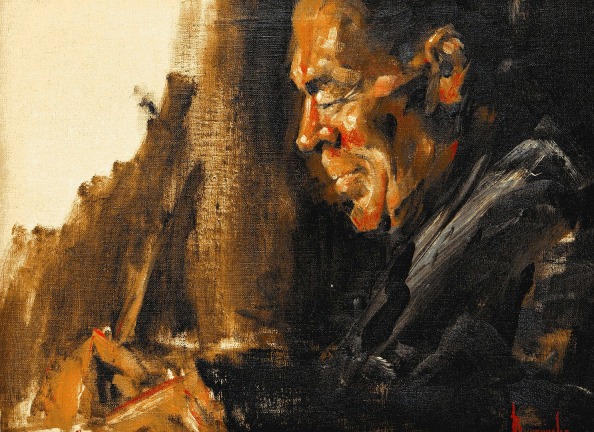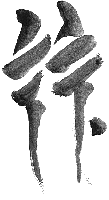
First and Only Weekly Online Fanzine Devoted to the Life and Works of Edgar Rice Burroughs Since 1996 ~ Over 15,000 Web Pages in Archive presents |

First and Only Weekly Online Fanzine Devoted to the Life and Works of Edgar Rice Burroughs Since 1996 ~ Over 15,000 Web Pages in Archive presents |

With his strong identification with the pulp era and adventure, there has not been considerable investigation into the philosophy of Edgar Rice Burroughs' books. There is a sparse amount of it openly available to those who have. Nevertheless, many of the threads of contemporary existentialist thought are remarkably mirrored in Burroughs' works from Tarzan to John Carter of Mars.Burroughs never questioned the personal beliefs of a man if the were founded on reason and applied with benefit to the human race, although he might occasionally poke fun at organized religion as he did in his examination of the unquestioned after-life beliefs on Mars (which led many on Barsoom to death).
Henry Hardy Heins of St. Luke's Lutheran Church in Albany writes that "ERB respected those who tried to live life sincerely according to their beliefs, while reserving his contempt for lives ruled by hypocrisy. 1
His was an individualistic philosophy sharing with existentialism's concern for individual effort in coming to grips with the universe in daily living.
Existentialist Soren Kirkegarrd's classic Fear and Trembling sees Abraham's decision to trust in God in the moment when his son's life is requested at the altar as a basic existentialist decision.
In a jungle setting, Tarzan makes a split second decision on life rescuing Teeka (the ape) from Histah (the snake) while risking his own life in Jungle Tales of Tarzan.
Why indeed had he (rescued her);
Teeka did not belong to him, nor
did Teeka's balu. They were both Tang's.
Why then had he done this thing?2
It was this emphasis on the personal decision making process that enabled Edgar Rice Burroughs to write such epic sagas on the men such as John Carter, David Innes, or Tarzan who made them,Burroughs seemed to feel that generally what one decides during the split seconds of crisis will generally be correct. He writes that
There seemed to Tarzan, now that he gave the matter thought, no reason in the world why he should have done the thing he did, and presently it occurred to him that he acted almost involuntarily. . . .3
This view is reflected in the comment by existentialist Jean-Pakul Sartre that "we have no excuses behind us and no justification before us.4
The heroes of ERB, however, never allowed this view to lead toward despair or cynicism. Filled with the zest to live life with gusto, they never saw it as the meaningless trap requested in Sartre's famous play No Exit.
Whether faced with capture, prison cells, or the apparent death of loved ones, Burroughs' characters gave a proud existentialist cry. John Carter, for example, continually reaffirmed his willingness to face perils on Mars by stating "I still live".
Burroughs himself made such a characteristic existentialist decision when he submitted the now famous A Princess of Mars to All-Story magazine in 1912. It was a bold departure from his contemporary factory work made out of confidence in himself.
Such confidence does ERB seem to have in this individualistic meeting of challenges that he seems critical of anything which might detract from it. John Carter tells some of the population of Barsoom that they "are a people without written language, without art, without homes, without love; the victims of eons of the horrible community idea.6Burroughs read enough pulp adventures to become convinced that he could write stories just as good, if not better.5Why, however, must only good flow from these existentialist decisions. Tarzan asks himself "What made him do such things?" He answers that "somebody more powerful than he must force him to act at times."7
History, however, with its wars and cruelty speaks only too well of man's free will to make wrong decisions -- even evil decisions by himself. He can walk away from brave acts, abhor love, and reject loyalty.Tarzan was sure that everything that was good came from God. His good act in refraining from slaying poor, defenseless old Gomangani; Teeka's love . . . his own loyalty.Burroughs' heroes have the potential for great good, but in continually focusing the decision making process in themselves they also have the ability to cause great social upheavals and even death. The great number of wars fought on Mars, for example, seem time and again to spring from John Carter's personal decisions; and while they may be motivated by the most altruistic of ideals it is also apparent that they come from a feel of the sword, the surge of power, and the flow of blood.Yes, Tarzan had found god, and he spent the whole day in attributing to him all the good and beautiful things in nature; but there was one thing which troubled him. He could not quite reconcile it to his conception of his newfound god.
Who made Histah, the snake?9Burroughs touches upon this in the following discussion between Turan and John Carter's daughter:
While written half a hundred years ago, how familiar is the rhetoric. It symbolizes the existentialist dilemma when confronted with analyzing an individual decision upon society as a whole."My father loves peace," returned the girl.
"And yet he is always at war," said the man.
She laughed. "But he says he likes peace."
"We all like peace," he rejoined; "peace with honor; but our neighbors will not let us have it, and so we must fight.10To Burroughs, as well as other existentialist thinkers, man is Jean-Jacques Rousseau's "noble savage." Tarzan was the epitome of such an ideal. Teaching himself to read and developing a personal morality within the wilds of the jungles, he becomes alienated when thrust into the outer world. John Carter encounters similar problems when he is pushed from the role of a personal liberator to a national ruler.
Perhaps here then is the place for community which Burroughs minimized. The community supplies the marketplace for ideas in which any one may make an existentialist decision to work for a change. Julian makes such a decision in challenging the kalkars (interestingly enough in the town marketplace in The Moon Men by Burroughs (1925)
Burroughs seems to speak to the disenchanted of today who feel cynical about decisions of the past.
"I am afraid that is hopeless," he said
"I may answer that," I said, in the famous worlds of John Carter:
"I still live!!!"11
2Edgar Rice Burroughs, Jungle Tales of Tarzan (New York: Ace Publishing Corporation, 1919), p. 71.
3ibid
4John -Paul Sartre, Existentialism, tr. by B. Freshtman ((Philosophical Library, Inc., 1947), p. 27.
5Lupoff, p. 42
6Edgar Rice Burroughs, A Princess of Mars (New York: Ace Publishing Corporation, 1963), p. 54
7Op. Cit. Burroughs, Jungle Tales of Tarzan, p. 71.
8Ibid., p. 72
9Ibid.
10Edgar Rice Burroughs, The Chessmen of Mars (Garden City, N.T.: Nelson Doubleday, Inc., 1922), p. 215.
11Edgar Rice Burroughs, A Fighting Man of Mars (New York: Ace Publishing Corporation, 1930), p. 66.After almost 50 years, here it is -- a copy of my work done in Cleveland, Ohio, around the mid-'70s. I also had a Burroughs family member give me a tour of the ERB, Inc., Tarzana office about this time. 
AFTERWORD BY AUTHOR JIM McKEE
I graduated from Ohio Wesleyan University Magna Cum Laude and Phi Beta Kappa in June, 1968. I was a reporter for the Cleveland Plain Dealer and went into teaching. I have an M. Ed. from Miami University of Ohio. I am still interested in Burroughs and collecting. Some of the nicest people I have met are in this hobby.
~ Jim McKee

BILL HILLMAN
Visit our thousands of other sites at:
BILL AND SUE-ON HILLMAN ECLECTIC STUDIO
ERB Text, ERB Images and Tarzan® are ©Edgar Rice Burroughs, Inc.-
All Rights Reserved. ERB quotes ©ERB Inc.
All Original Work ©1996-2023 by Bill Hillman and/or Contributing Authors/Owners
No part of this web site may be reproduced without permission from the respective owners.